 Leading Blog | Posts by Month |
 Leading Blog | Posts by Month |
12.29.06

Why Are Leaders in Such Short Supply?
ROB GOFFE and Gareth Jones, authors of Why Should Anyone Be Led By You? wrote: Given the hunger for leadership, why are leaders in such short supply? We think there are two fundamental reasons. 
Posted by Michael McKinney at 12:43 AM
12.27.06

Reactions to Gerald Ford's Death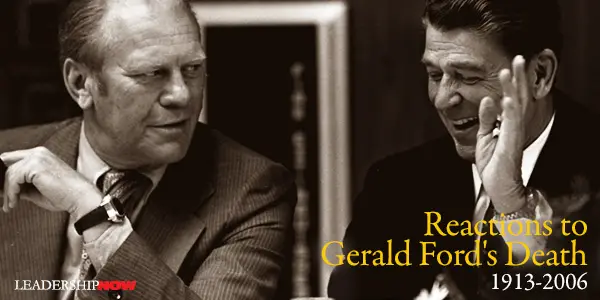
"My family joins me in sharing the difficult news that Gerald Ford, our beloved husband, father, grandfather, and great grandfather has passed away at 93 years of age… His life was filled with love of God, his family, and his country.'' —Betty Ford, in a brief statement issued from her husband's office in Rancho Mirage, Calif.
"I was deeply saddened this evening when I heard of Jerry Ford's death. Ronnie and I always considered him a dear friend and close political ally. His accomplishments and devotion to our country are vast, and even long after he left the Presidency he made it a point to speak out on issues important to us all." —Former first lady Nancy Reagan
"He had to bring our country back and make it whole again and he did it with dignity, he did it with great, great skill and sensitivity." —Alexander Haig, Mr. Ford's former chief-of-staff
"Throughout his career, as a naval officer, congressman, vice president, and president, Gerald Ford embodied the best values of a great generation: decency, integrity, and devotion to duty. Thirty-two years ago, he assumed the nation's highest office during the greatest constitutional crisis since the Civil War. In that troubled era, America needed strength, wisdom, and good judgment, and those qualities came to us in the person of Gerald R. Ford. … I was proud to know President Ford and to have served in the White House as his chief of staff. He was a dear friend and mentor to me until this very day." —Vice President Cheney
"President Ford is one of the most admirable public servants and human beings I have ever known. A man of the highest integrity, his life-long dedication to helping others touched the lives of countless people. An outstanding statesman, he wisely chose the path of healing during a deeply divisive time in our nation's history. He frequently rose above politics by emphasizing the need for bipartisanship and seeking common ground on issues critical to our nation." —President Jimmy Carter
"President Ford was a great man, a great leader, and perhaps Michigan's greatest son. He served his country with distinction for his entire adult life. He will be remembered as a president who kept America together during one if its greatest crises. He and his wife Betty have demonstrated great courage and the highest values throughout their lives. He will be missed." —Jane Abraham, co-chairwoman of the Michigan Republican Party
"Gerald Ford and I came from different sides of the aisle, but we forged a wonderful friendship as we served Michigan together in the House of Representatives. When his nation called on him to serve his country ... he rose up and held the country together. It will certainly be his legacy. I will remember him fondly and I will miss him dearly." —U.S. Rep. John Dingell
"He became president of the United States during a trying time and immediately began the difficult process of healing a nation torn apart by scandal. He will be remembered for leading with integrity and character. He brought West Michigan values with him to Washington and maintained them throughout his rise from congressman… to vice president and president." —U.S. Rep. Pete Hoekstra
Posted by Michael McKinney at 12:30 AM
12.26.06

Former President Gerald R. Ford Dies Today at 93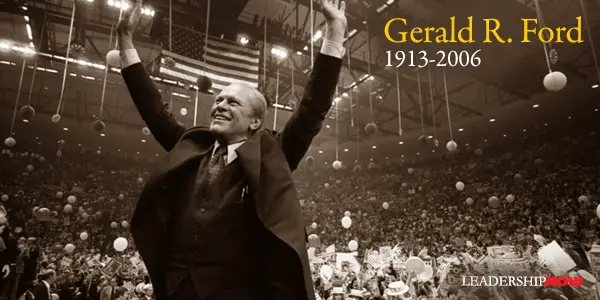
FORMER president Gerald R. Ford died at 6:45 p.m. today at age 93. He was 38th (1974-77) and only unelected president in America's history. He was also the longest living president, followed by Ronald Reagan, who also died at 93. 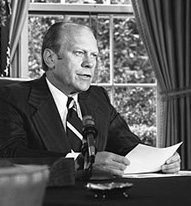 President Ford epitomized servant-leadership. He did what was best for those he led no matter what the cost might have been for him politically. He believed in the importance of leading by example. He spent his career serving his country and healed his country. He was the right man at the right time. He was a humble, honest man and a great leader. "The American people will always admire Gerald Ford's devotion to duty, his personal character and the honorable conduct of his administration," President Bush said in a statement tonight. "We mourn the loss of such a leader, and our 38th president will always have a special place in our nation's memory." "During a time of disquiet and uncertainty, Ford, through his inherent decency, almost single-handedly restored the faith of the American people in their government" wrote Mark Updegrove in Second Acts. President Ford closed his autobiography, A Time To Heal, upon leaving the White House in 1978 with these words, “My thoughts went back to the morning of August 1, 1974, when I received that first phone call from Al Haig. And I remembered how cloudy it had been in Washington that day. Now I looked out the window of the plane. The sun was shining brightly. I couldn’t see a cloud anywhere, and I felt glad about that.”  Quotes by Gerald Ford:
Posted by Michael McKinney at 11:00 PM
12.25.06

Best Leadership Books of 2006 Our selection for the best leadership books of 2006 are listed below. The books listed below—in no particular order—we believe, have added something unique or a useful restating of important insights that we all need to be reminded of as we develop our leadership skills. It's true, as Michael Silverblatt wrote, "The art (as opposed to the technology) of reading requires that you develop a beautiful tolerance for incomprehension. The greatest books are the books that you come to understand more deeply with time, with age, with rereading." Because we only see what we believe, it's through time, experience and personal growth, that we are able to draw insight and connections we didn't see before. In 2006 at least three biographies were released that are worthy of mention:
Posted by Michael McKinney at 10:00 AM
12.22.06

What Drives Our Leadership Impact“Where others see hierarchies, the new leaders see connections” writes Emmanuel Gobillot in his book, The Connected Leader. What differentiates a connected leader is the way in which they impact and influence those around them and this is largely determined by the way in which they view good leadership. More than even our individual skill-set, how we see the role of leadership greatly determines the impact we have on others and the success we will have as leaders.Our impact is the result of a number of factors. Using the iceberg metaphor, above the waterline for all to see, are skills and knowledge. Gobillot writes, “Skills and knowledge are important because they give the leader the ability to take part in the game. On their own, they do not differentiate between average and superior performance…. But it is below the waterline that the real differentiators lie. …Below the waterline, the drivers of impact can be found. Performance will differ depending on how people see their role. If doctors believe that their primary role is solving problems, their behavior is likely to be different from that of surgeons who see their roles as healers.” We need to examine our beliefs if we are to change our impact and effectiveness with those around us.  Often we see the "smartest person in the room" or "the leader of all leaders" mind-set to thinking about leadership. With this mentality we won't have the necessary ability to work well with other leaders and developing community. As Jean Lipman-Blumen wrote in Connective Leadership, "leaders cannot just issue orders; instead, they have to join forces, persuade, and negotiate to resolve conflicts." Your ability to do this is largely determined by the "below the waterline" type factors.
Posted by Michael McKinney at 12:14 AM
12.20.06

The Go PointMen make their own history, but they do not make it as they please; they do not make it under self-selected circumstances, but under circumstances existing already, given and transmitted from the past. 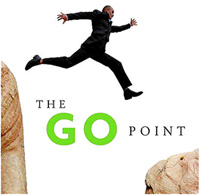 Yet, within those constraints, argues Michael Useem, we have the opportunity to make our own destiny. We all make decisions all the time. Some decisions are in consequential, but often we are called upon to make consequential decisions—those that affect other people. Some people are very good at consistently reaching good decisions in a timely way. Yet, it is surprising how many people are just not great at knowing when to pull the trigger, and how to pull it when they do. The Go Point seeks to address that concern. By taking us into the moment when decisions were made, both good and bad, Useem digs out the principles that emerge from these experiences. From these examples, he constructs templates of fifty principles and tools we can bear in mind when faced with similar types of decisions. He advises us to identify the five or ten lessons that are most salient for the decisions that we most frequently face and then concentrate on just those.
Yet, within those constraints, argues Michael Useem, we have the opportunity to make our own destiny. We all make decisions all the time. Some decisions are in consequential, but often we are called upon to make consequential decisions—those that affect other people. Some people are very good at consistently reaching good decisions in a timely way. Yet, it is surprising how many people are just not great at knowing when to pull the trigger, and how to pull it when they do. The Go Point seeks to address that concern. By taking us into the moment when decisions were made, both good and bad, Useem digs out the principles that emerge from these experiences. From these examples, he constructs templates of fifty principles and tools we can bear in mind when faced with similar types of decisions. He advises us to identify the five or ten lessons that are most salient for the decisions that we most frequently face and then concentrate on just those.
The underlying point in this book is that decision making is a learned skill. You've got to make decisions and then look back on them and mine what lessons you can in order to improve your next decision. Whether it's a long term decision or a split second decision, there is a point when you have to force yourself to make it. That moment is the go point. He writes, “The go point is not always a matter of getting to yes….Rather, the go point is that instant when the choice gets made, whether no or yes, and the commitment moves from consideration to action. How you jump at that moment can make a vast difference, not only for yourself but also for all around you." Below is a template for looking at some of the most commonly encountered problems in reaching a decision.
Posted by Michael McKinney at 08:49 AM
12.18.06

5 Things Leadership is NotGreg Morris, asks us in his book, In Pursuit of Leadership, to consider five things leadership is not:
He adds, “The reality of true leadership is that your rights actually DECREASE as you rise in the organization, while your responsibilities INCREASE. This suggests that leadership involves not power or prestige but servanthood.” In Pursuit of Leadership is an interesting analysis of the life of Moses—a man nearly all of us are familiar with—in terms of his leadership and the path he took to get there. He points out that the accomplishments that Moses is known for “materialized in the final third of his life…. The first eighty years of Moses’ life molded him into a man that God could trust and use. There is no shortcut to spiritual preparation and leadership training. Only through the crucible of life can patience, discipline, character and maturity be developed.”
Posted by Michael McKinney at 08:21 AM
12.15.06

Walt Disney: The Triumph of the American Imagination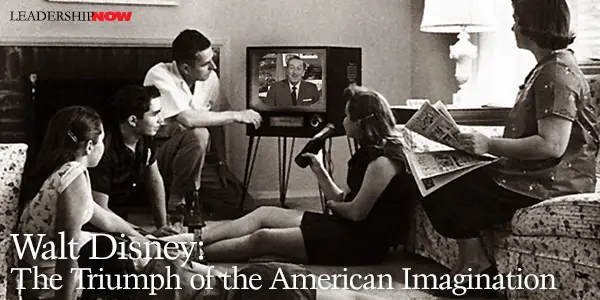
WALT DISNEY is arguably one of the most influential Americans of the twentieth-century. (The Atlantic listed him at number 26 in their recent listing of influential Americans.) He died 40 years ago today at age 65 in Los Angeles. Steven Watts writes in The Magic Kingdom, "Walt Disney operated not only as an entertainer but as a historical mediator. His creations helped Americans come to terms with the unsettling transformations of the twentieth century. This role was unintentional but decisive. Disney entertainment projects were consistently nourished by connections to mainstream American culture — its aesthetics, political ideology, social structures, economic framework, moral principles — as it took shape from the late 1920s through the late 1960s.” The biography of Disney by Neal Gabler is the best portrait of Disney to date. With unprecedented access to Disney family achieves, Gabler tells a story of a man that would not be deterred from his many disappointments and failures to fulfill his dreams and in the end, decidedly alter the American consciousness. Unfortunately for Disney, his dreams didn’t always bring him personal happiness.Disney once remarked, "All the adversity I've had in my life, all my troubles and obstacles, have strengthened me... You may not realize it when it happens, but a kick in the teeth may be the best thing in the world for you." Gabler concludes that of all Disney’s contributions, his greatest is that “he demonstrated how one could assert one’s will on the world at the very time when everything seemed to be growing beyond control and beyond comprehension. In sum, Walt Disney had been not so much a master of fun or irreverence or innocence or even wholesomeness. He had been a master of order.”
Posted by Michael McKinney at 12:06 AM
12.13.06

Who Will Succeed or Fail in the Corner Office?
CAROL HYMOWITZ asked in Monday’s Wall Street Journal, “which CEOs have the skills to survive the New Year’s challenges?” In her article she writes: The true test of enduring leadership success is how well business leaders handle setbacks and failures. They can advance by outperforming others, but they can't always be in control. A leader’s communication flexibility and consistency is important in this regard. Leaders are not only expected to influence their direct reports, Gene Klan writes in his new book, Building Character, but “are also expected to influence their superiors, board members, peer, customers, clients, suppliers, the news media, community officials, political leaders, government regulators, negotiators, environmental authorities, special interest groups, Wall Street Analysts, and any number of other stakeholders…. [E]ach group requires different tactics to be influenced and led both effectively and positively. Leaders need flexibility and many different skills to communicate credibly and interact with all these parties for maximum results.” Consistency is a matter of character. “For leaders,” Klan continues, “consistency means always reflecting the same basic principles in practice. It means that one’s behaviors conform and agree with one’s past words and actions regardless of pressure, criticism, and advice to do otherwise. It means maintaining the habitual positive behaviors that are key to winning trust and respect and achieving effectiveness overall. It means being seen and known as a pillar of dependability and reliability, not changing or wavering based on opinion polls, internal disapprovals, or external condemnations." "Consistency also implies that a leader’s behaviors and character are not compartmentalized between work and personal life. You are who you are, and that doesn’t change when you arrive at the office or at your own front door. Your character is such that you find consistent standards for behavior in any context. Responsibilities, stresses, and personalities may vary, but your character does not. All the politically correct arguments to the contrary do not change that reality. Behaviors reflect a leader’s character regardless of the context. In every context, your character will be noticed and judged.” It is these leaders that have to best chance of surviving the challenges that lie ahead in the coming year. 
Posted by Michael McKinney at 08:52 AM
12.11.06

Leadership Challenges Issues such as the authority deficit and the decay of meaningful community will become even more obvious in the coming years as we struggle to deal with them. As we begin to discover the emerging problems related to these issues, we might find that we to reexamine our own attitudes concerning them before anything meaningful can be done to correct the situation.
Posted by Michael McKinney at 12:29 AM
12.08.06

No Smoke‚ No Mirrors ... Straight Down the Middle
ROBERT W. LANE, the former “chief steward” (as he referred to himself) of the 169-year-old John Deere Company, shared a few thoughts on integrity to the students at the Mendoza School of Business of the University of Notre Dame. First, it is probably best to define what I mean when I say “integrity.” It means: “No smoke‚ no mirrors, no tricks … straight down the middle.” It means no exaggerations, no dissembling; just the “real deal.”
Posted by Michael McKinney at 09:30 AM
12.06.06

The Era of Professional Management is Dead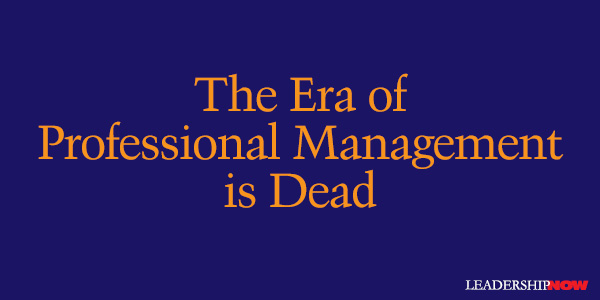
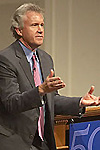 The Darden School news release states: To prepare, he advised Darden students to gain expertise in six key areas:
The Darden School Dean, Robert F. Bruner added some comments of Immelt’s talk on his blog: To be a growth leader is to stimulate organic growth of a firm through close acquaintance with the needs of the customer. Thus, “domain knowledge” is important—the knowledge that can help you decide what to sell, to whom, and where to make it. Jack Welch believed in the theory of the “best available athlete,” the generalist who could be transferred successfully from turbines, to medical devices, and to TV production. Immelt believes that higher competition requires a closer knowledge of the customer than the best athlete model allows.  In the same post, Bruner has also left some impressions of Immelt that are worth reading. Robert Bruner himself is an interesting and articulate man. I especially appreciated his comments on “Getting a Life.” He writes, “ High-performance professionals must have a renewing life outside of the workspace. You can’t sustain a high rate of intensity without a break. This varies for everyone, of course. But the formula should include some kind of exercise, family or community-oriented engagement, and some strictly personal break time.” He shares what works for him in his own personal renewal program. Reading, cycling, food and wine, and foreign travel resonated with me.
Posted by Michael McKinney at 08:55 AM
12.04.06

Leadership Agility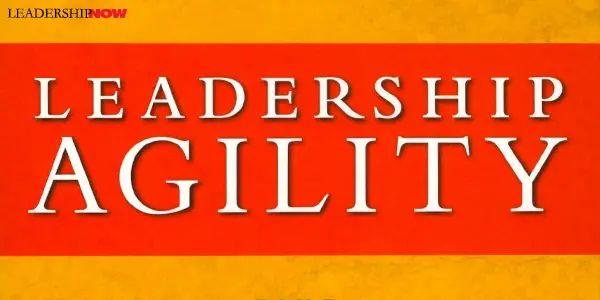
WHAT IS leadership agility? Like agile organizations—organizations that anticipate and respond to rapidly changing conditions by leveraging highly effective internal and external relationships—leadership agility is the ability to take wise and effective action amid complex, rapidly changing conditions. Leadership Agility is an interesting, thorough, and well-written book and one of the best on the topic. Authors Bill Joiner and Stephen Josephs encouragingly tell us that their research “reveals a significant set of findings about the relationship between personal development and leadership effectiveness: As adults grow toward realizing their potential, they develop a constellation of mental and emotional capacities that happen to be the very capacities needed for agile leadership.”Building on the pioneering work of Piaget and Erickson in mapping the stages of human development from infants to adulthood—the pre-conventional stages—the authors identify three more stages they call the conventional stages: Conformer, Expert and Achiever. And finally, there are the post-conventional stages they call: Catalyst, Co-Creator, and Synergist. 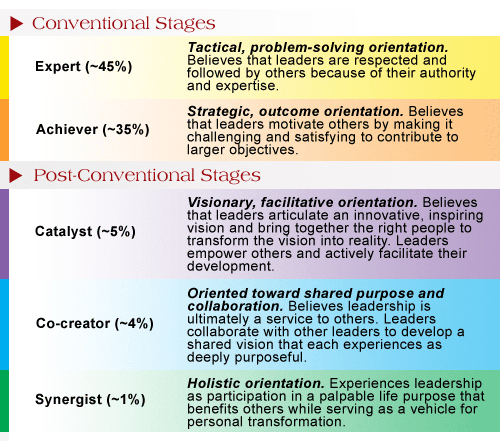 Some people, of course, may never move through all of the stages. Of the 600 managers they studied, most never move beyond the Achiever stage. They write, "Most top executives and administrators, state and national politicians, influential scientists, and other highly successful professionals have stabilized their development at [the Achiever] stage." Only about 10 percent of today’s managers operate at the post-conventional stages of adult development. What does it mean to be at one of the post-conventional stages? Research has shown that people at these post-conventional stages are more deeply purposeful, more visionary in their thinking, and more resilient in responding to change and uncertainty. They’re more welcoming of diverse perspectives and have a greater capacity for resolving differences with other people. They’re also more self-aware, more attuned to their experience, more interested in feedback from others, and better at working through inner conflicts. These stages are sequential and are not personality dependent. In other words, any one can be at any stage but you can move to another stage until you have mastered the one you are at. The question is, “How can we begin to move through these stages of development?” Simply put, you get there by practice—by putting the capacities and traits to work and learning to apply them in various situations. Each stage represents the maturation to a certain point of four competencies and their respective mental and emotional capacities. They state that highly agile leaders orchestrate the four competencies so that they work in concert. They have developed the Leadership Agility Compass to graphically represent these competencies. All eight of the capacities contribute directly to your effectiveness as a leader. 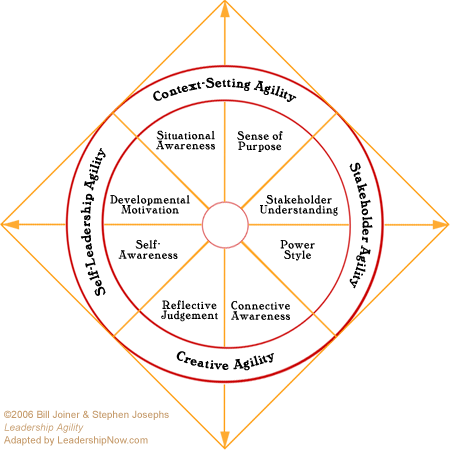 The outer circle on this graphic represents the tasks carried out using the four leadership agility competencies. The middle circle represents the four pairs of capacities that support these competencies. The four mutually reinforcing competencies are: Context-setting agility improves your ability to scan your environment, frame the initiatives you need to take, and clarify the outcomes you need to achieve. It entails stepping back and determining the best initiatives to take, given the changes taking place in your larger environment. Stakeholder agility increases your ability to engage with key stakeholders in ways that build support for your initiative. It requires you to step back from your own views and objectives to consider the needs and perspectives of those who have a stake in your initiatives. Creative agility enables you to transform the problems you encounter into the results you need. It involves stepping back from your habitual assumptions and developing optimal solutions to the often novel and complex issues you face. Self-leadership agility is the ability to use your initiatives as opportunities to develop into the kind of leader you want to be. It entails stepping back; becoming more aware of your thoughts, feelings, and behaviors; and experimenting with new and more effective approaches. After laying this groundwork in far more detail, Leadership Agility provides real life stories to demonstrate what leadership looks like at that level and then clarifies what it takes to move to the next level. You will also learn how to become more effective in your current level of agility. 
Posted by Michael McKinney at 09:02 AM
12.01.06

Leadership Books: December 2006Here's a look at some of the best leadership books being released in December. For a look a little further out see the Upcoming 2007 releases.    
Posted by Michael McKinney at 07:53 AM
|
BUILD YOUR KNOWLEDGE


How to Do Your Start-Up Right STRAIGHT TALK FOR START-UPS 
Grow Your Leadership Skills NEW AND UPCOMING LEADERSHIP BOOKS 
Leadership Minute BITE-SIZE CONCEPTS YOU CAN CHEW ON 
Classic Leadership Books BOOKS TO READ BEFORE YOU LEAD |
|